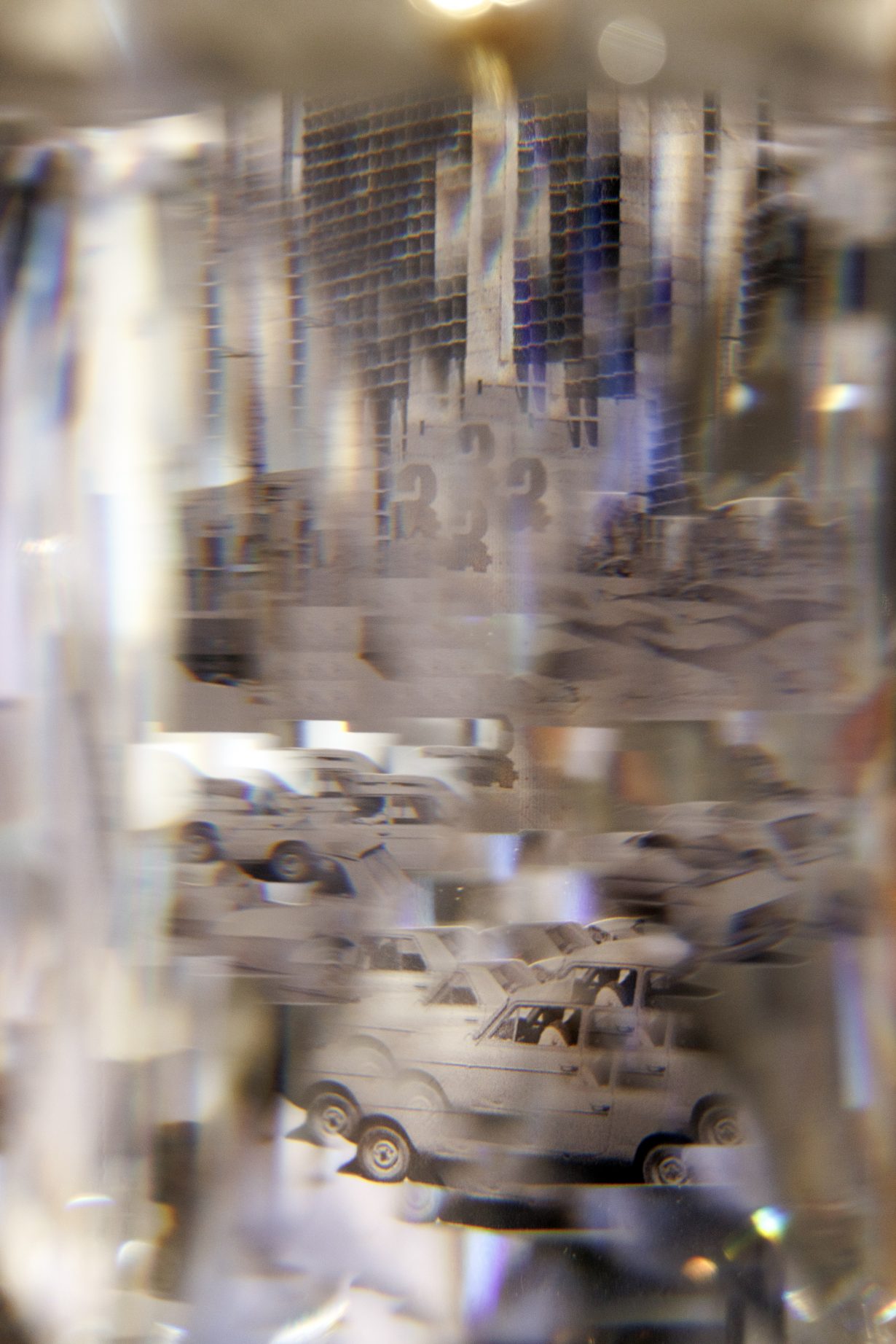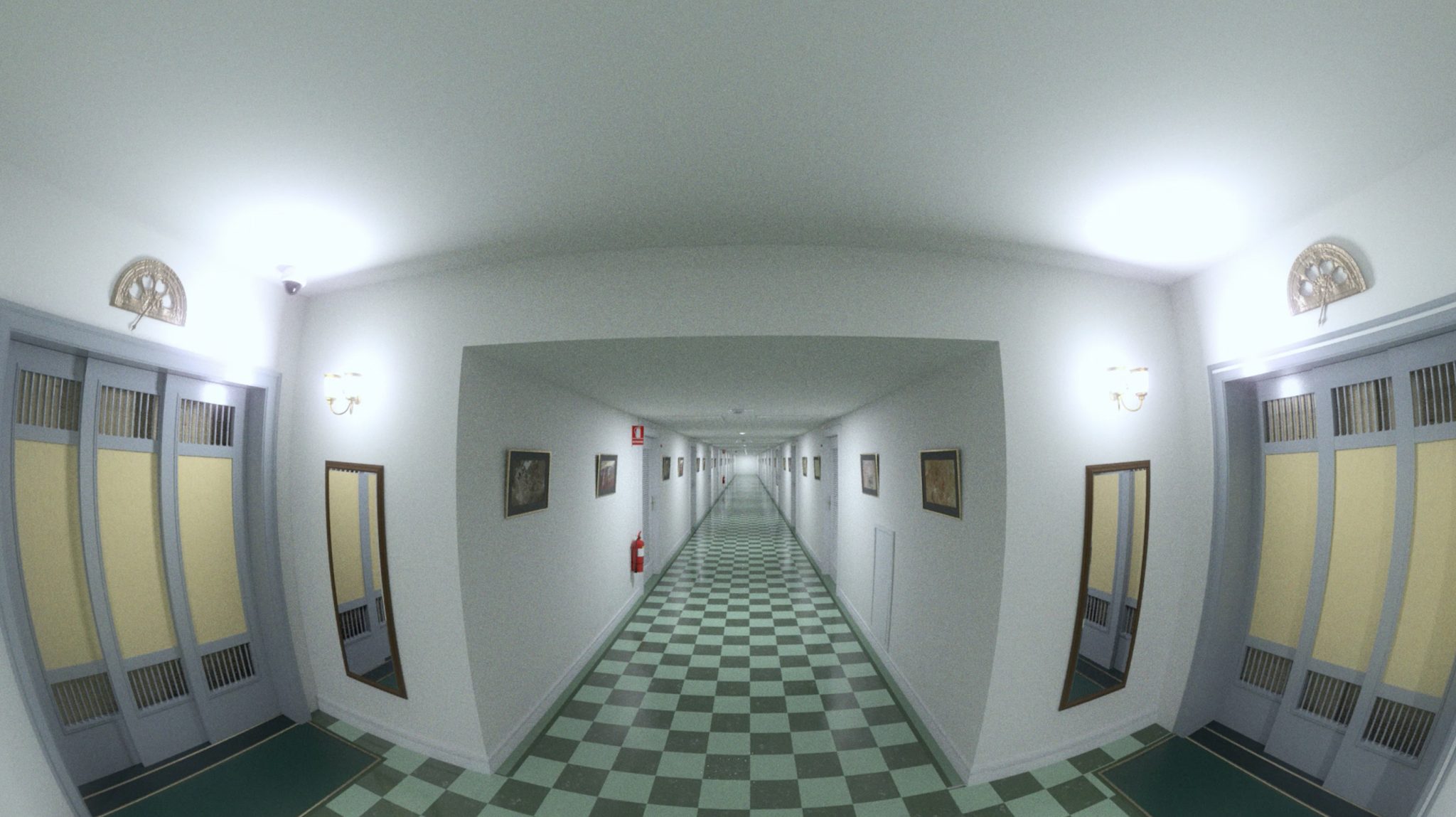Guest Relations at Jameel Arts Centre, Dubai explores an ethics of hospitality, ownership and sovereignty
Comprising works by more than 30 artists and curated so as to reflect the architectural structure and layout – lobby, room and corridor – of a hotel building, Guest Relations excavates sociopolitical relations that are found in and developed alongside infrastructures of contemporary hospitality. Given this, it’s something of a shock, on entering the show, immediately to encounter an empty front desk. This vacant reception is captured in a large-format photograph from Lamya Gargash’s Familial series (2009), which documents budget hotels in Deira, these days part of Dubai’s old town. Covered in cheap marble with dusty corners, the depicted place is decorated with a sign listing emergency fire contacts, an old-fashioned five-dial world clock (alongside a single-dial local one) and a UAE flag, all of it watched over by a trinity of Emirati leaders, including Sheikh Khalifa bin Zayed Al Nahyan (former president of the UAE) and Sheikh Mohammed bin Rashid Al Maktoum (ruler of Dubai), mounted in plastic frames. Brown, beige and slightly grubby, it’s an image that disperses the mirage of Dubai’s opulent comfort. What remains is an abject, liminal space – gesturing between arrival and departure, migration and rest, and perhaps reception and interrogation (hotels are another site at which your passport gets checked) – built to provide basic shelter rather than the type of ‘leisure’ marketed by fashionable hotels today. We are reminded that there are limits to both service and welcome.
During the course of the exhibition, the hospitality industry is reconsidered as a site of modernisation, nation-building, imperial control and menial labour. It is also a space for rumination on hotels and other milieus of service – aeroplanes, cruise ships and the internet – as marginal, transitory social spaces telling stories of migration, and as precarious places of geopolitical tension. Opening less than a month after the outbreak of the Israel–Gaza war, the show and its thematics are inevitably shrouded in a layer of irony, horror and prophecy.
For an exhibition about an industry supported by service and labour, human bodies feel eerily absent, and we’re reminded of that by Mati Jhurry and Nabla Yahya’s reconstruction of an empty Emirates crew rest compartment, in which the warmth of the workers’ missing bodies seems to linger. The installation forms a part of Jhurry’s larger performance piece Lavatory videos from the archive of ‘Emirates staff No. 460956’ (2023) – for which Jhurry worked as an Emirates crewmember on a three-year contract and secretly filmed themself in plane lavatories announcing the date, time and flight number of each flight they served. The structure – a patchy, skeletal shell of the cabin, reproduced from memory – hangs from the ceiling of the gallery like the remains of a sea creature or a lost shipping container; its monstrous size contrasts with its function – to conceal resting crew from passenger view. Perhaps a precedent to Jhurry’s performance, across the room is Sophie Calle’s The Hotel, Room 44 (1981–83). For this, Calle worked as a chambermaid in a Venetian hotel, where she would rummage through each guest’s personal items – their lingerie, medicine and diaries – and document them with a voyeuristic zeal. The resulting photographic diptychs resemble forensic records and give the hotel workers the intrusive presence and agency that seem absent in Jhurry and Yahya’s work. Facing each other almost 40 years apart, the two works collectively offer up a dystopian prospect in which providers of hospitality and those receiving it are increasingly engaged in a battle of who is surveilling whom (or who is being lulled into a false sense of security).

Discussing the ethics of hospitality, philosopher Jacques Derrida notes the relationship between the words hospitality and hostility – both derived from their Latin root ‘hostis’, denoting a stranger – which in turn points to the thin line between a guest and an enemy. In this vein guests are potential threats, to be kept under surveillance or hostage. Ala Younis’s new work Double-Sided Mirrors (2023) takes the shape of a chandelier found in Baghdad’s Al Rasheed Hotel – built in 1982 to host the seventh summit of the Non-Aligned Movement (later relocated to New Delhi because of the Iran–Iraq War) – which was rumoured to have two-way mirrors, among other surveillance tools, to spy on foreign journalists reporting on the Gulf War during the 1990s. Through the chandelier’s kaleidoscopic crystal prisms, fragmentary news images of the hotel’s interiors, detained journalists, countersurveillance devices and military attacks appear behind this dazzling piece of modernist decor, recasting the hotel as an ideological as well as military battlefield. Sung Tieu’s video Moving Target Shadow Detection (2022) takes alternating perspectives of CCTV cameras and a drone panning the corridors and rooms inside Hotel Nacional de Cuba, where US and Canadian embassy staff reported the first cases of what came to be called Havana Syndrome, a possibly psychogenic set of symptoms including dizziness, nausea and memory loss. Here hotels are claustrophobic sites of terror, international espionage and warfare, where both the guests and the hosts are in a state of mutual suspicion and paranoia.
Ambiguity and unease haunt the rest of the show. With a title taken from the lyrics of a Leonard Cohen song, Michael Rakowitz’s video essay I’m good at love, I’m good at hate, it’s in between I freeze (2023) negotiates the fraught relationship of welcome and rejection. In the video, Rakowitz reads a fan letter he wrote to Cohen in 2015, in which he attempted to resolve the contradiction between Cohen’s humanistic words and his support of Israel’s military expansion (the singer performed for Israeli soldiers on various military bases during the 1973 Arab–Israeli War). And in 2009, a performance by Cohen scheduled for Ramallah was boycotted and cancelled because of the singer’s prior stance. Reflecting on family history, identities and erasure, Rakowitz asked Cohen for permission to recreate the cancelled concert. The request went unanswered, but after I’m good at love… premiered earlier in 2023, showing Rakowitz performing Cohen’s If It Be Your Will (1984) in an empty theatre, his rights to perform the song were rescinded by Cohen’s estate, presumably for the video essay’s pro-Palestinian position (the soundtrack of Rakowitz’s performance was subsequently removed, and replaced by the voice of artist Emily Jacir reading excerpts from Edward Said’s 1986 book, After the Last Sky). The work as a whole brings into question the ideology of ownership and sovereignty that underpins notions of universal charity and brotherhood. It’s a discussion that continues to plague the world today in contexts of occupation, genocide, forced displacement and war. Who is a host, who is a guest – and how do you tell them apart?
Guest Relations at Jameel Arts Centre, Dubai, through 28 April
